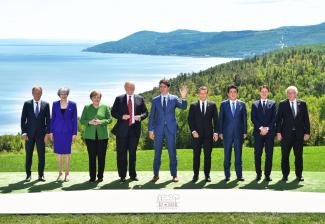Global affairs
Do what you preach

Mahbubani, who teaches public policy at Singapore’s national university, spells out “the west’s” interest in a rules-bound global order in a convincing manner. He emphasises, for example, that the EU has brought about lasting peace on a continent that used to be rocked by wars. At the same time, he warns western governments, whose global hegemony is waning fast, that they are about to waste a great opportunity.
Explicitly referring to Steven Pinker and his many statistics on child mortality, hunger, war and accidents (see D+C/E+Z e-Paper 2018/07, p. 16), the former diplomat writes that people in emerging markets and developing countries are aware of how positive recent trends were internationally. In his eyes, the west should endorse multilateral policy approaches to ensure that global goals are achieved.
He worries, however, that domestic frustration in view of the west’s own relative stagnation is leading to short-sighted and destructive nationalism. He makes it quite clear that US President Donald Trump is undermining his nation’s influence rather than making America great again.
Mahbubani praises the west for having replaced feudalism with reasoned policymaking, as well as for overcoming fatalism and driving technological progress. One chapter actually has the title “The gift of western wisdom”. However, he declares that Asian, African and Latin American countries have learned those lessons and are applying them. Mahbubani correctly points out that China and India – the world’s most populous nations – are set to become its largest economies moreover.
On the foundation of “reasoned thinking”, the author argues, economies are growing fast, and “the rest” is catching up with “the west”. He points out, for example, that the G7’s share of global GDP was 31.5 % in 2015, whereas the seven biggest emerging markets together accounted for 36.3 %.
Mahbubani declares: “The west has been at the forefront of world history for almost 200 years. Now it has to learn to share, even abandon, that position and adapt to a world it can no longer dominate.” The former UN ambassador accuses the west of several serious mistakes in recent years. Western arrogance, he argues, has fuelled resentment in many places, including Russia as well as predominantly Muslim countries.
Generally speaking, western interference in foreign countries’ domestic affaires, according to Mahbubani, tends to be “thoughtless” and counter productive. The worst example was probably the Iraq war, which US President George W. Bush launched on the basis of lies, lacking a mandate from the UN Security Council. Mahbubani appreciates the reasons why many US citizens are appalled by Russian interference in the 2016 elections, but he also emphasises that consecutive US administrations interfered in many elections all over the world.
Instead of trying to impose their will, Mahbubani admonishes western governments: “We can and should strengthen multilateral institutions of global governance, like the UN, the IMF, the World Bank and the WHO to take care of common global challenges.” He calls for a new global consensus and elaborates that the “Charter of the United Nations and the Universal Declaration of Human Rights, which espouse many universal values, can provide the foundation”. By living up to multilateral principles, the west can entrench those values, which may then bind the rising powers, Mahbubani argues. Attempts to cynically manipulate global affaires, by contrast, will only speed up western decline.
Western policymakers are well advised to pay attention to Mahbubani. He articulates grievances that are shared by many people in developing countries and emerging markets. That said, readers in the less advantaged countries should carefully check whether everything he writes is really accurate.
For example, he offers no serious evidence for his claims that President Xi Jinping of China feels accountable to his people or that Prime Minister Narendra Modi of India is keen on improving governance. Both leaders are known for restricting the civil-society space and maximising their personal grip on power. China’s spectacular successes in the fight against poverty, however, occurred before Xi rose to power (see Nora Sausmikat in D+C/E+Z e-Paper 2017/02, p. 33), and its people are less and less allowed to express criticism.
In India, where courageous journalists are still able to express critical views, some people certainly do not share Mahbubani’s assessment (see Arfa Khanum Sherwani in D+C/E+Z e-Paper 2018/05, p. 36). Mahbubani’s criticism of the west certainly deserves more attention that his praise for authoritarian leadership.
His definition of good governance as “functional” rather than democratic governance is not convincing. Singapore is an unusual country in the sense that it is known both for comparatively authoritarian rule and comparatively low levels of corruption. To people living there it may seem that strongman-imposed order is benign. In most places, that is not so – at least not in the long run. Dictatorship typically goes along with exploitation and abuse. Developmental dictatorships are the exception.
Reference
Mahbubani, K., 2018: Has the west lost it? A provocation. London: Allen Lane.













